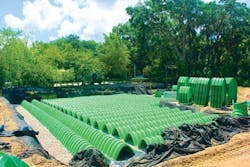About the author: Dirk Fischbach is communications liaison for RJ Conlin Marketing & Design. Fischbach can be reached at [email protected] or 734.417.1006.
Developers wanted to create a new Ace Hardware store to serve the Tampa suburb of Bloomingdale, Fla.
The high groundwater table in the Bloomingdale area and the space limitations caused by the close proximity of existing infrastructure made an underground storm water management system the best choice. Developers needed to find a system that could accommodate the rainfall from a large storm event while being strong enough to withstand the loads of a commercial parking lot.
Above image: Chamber installation took place in conjunction with other elements of the hardware store's construction and was completed without delaying the other work at the site.
Additionally, because the storm water management system was being installed in conjunction with other elements of the hardware store’s construction build-out—and was being done in an existing retail landscape—it was important that the project be carried out with minimal disruption to other ongoing work.
Due to the location of the store relative to existing infrastructure, there also was a need to protect municipal storm sewers from runoff during heavy precipitation events.
These constraints pointed to the need for a high-volume storage solution flexible enough to fit the site parameters while also meeting the developers’ budget.
Storage Selection
After considering several options, the development team chose a system comprised of Triton Stormwater Solutions M-6 chambers. To manage high runoff volumes, which can carry a substantial sediment load, the developers and the manufacturer’s engineering team designed a primary and secondary Main Header Row (MHR) system that would manage the incoming sediment and volume of a first flush by creating a two-stage holding area to contain and settle the inflow before the water was sent to the distribution rows for storage. This would help reduce maintenance costs over the life of the system, as sediment could be captured in the MHRs, where it is more easily removed, rather than migrating to the storage chambers, where it can interrupt the natural leaching of the water back into the ground.
This seepage of the water back into the water table replicates the natural hydrology of an area, mitigating the impact of impervious surfaces, such as paved parking lots and roof lines.
While some underground systems implement weir structures within their manholes, which reduces the capacity of a system for treated water, the two-stage MHR design allowed for a greater volume of storm water to be treated prior to moving to the storage rows. This helps to protect the municipal storm sewers during heavy precipitation events.
The M-6 chamber was ideal for the installation because of its volume-to-size ratio. Weighing 12 lb each, the chambers are 34 by 17.5 by 32 in. and have a minimum of 11.5 cu ft of storage per chamber when installed with only 6 in. of crushed stone above and below the system.
Installation
To prepare the site for chamber installation, developers excavated the trench and lined it with Class II non-woven geofabric before putting down a 6-in. base layer of crushed stone.
Wetherington Tractor Service was the general contractor, and its team of four had the entire storm water system installed, from excavation to topping, in one week. The actual installation of the chambers took less than one day, and the entire project was done without delaying the other work going on.
An advantage of underground storm water systems is the ability to fully utilize the land. In this case, the store’s parking lot was placed directly above the storm water system, taking advantage of the chambers’ strength and the developers’ vision for maximizing space.
Planning for the Future
The storage system is able to store more than 9,200 cu ft of water in a footprint of 6,946 sq ft. The system's design offers protection in heavy rainfall events, and ease of maintenance that will pay dividends into the future.
The Ace Hardware is scheduled to open in the fall of 2016.
“I was very impressed with the Triton system,” said Kimball Wetherington, owner of Wetherington Tractor Supply. “The chambers are easy to handle, easy to use and they create a tremendous savings over competitive products—not only in initial cost, but also in the fact that less stone backfill is needed because they are so strong.”


